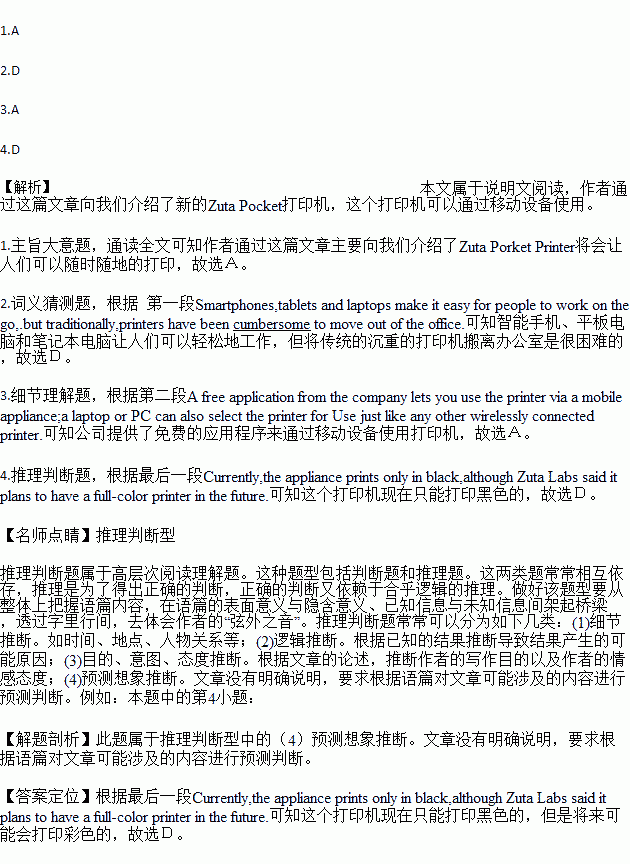题目内容
Smartphones, tablets and laptops make it easy for people to work on the go, but traditionally, printers have been cumbersome to move out of the office. However,the new Zuta Pocket Printer will enable people to print anywhere.
The Zuta Pocket Printer was invented by Zuta Labs, based in Jerusalem. This small printer is about 10.2 cm wide and long and 7.5 cm high, and weighs about 350 grams. The company plans to ship its printers to customers in the beginning of 2017.
This printer can connect wirelessly to smartphones, tablets, laptops and PCs via Wi-Fi, and is supported by Android, iOS, OS X and Windows. A free application from the company lets you use the printer via a mobile appliance; a laptop or PC can also select the printer for use just like any other wirelessly connected printer. This printer can print one average A4 page, measuring 21 by 29.7 cm. Zuta Labs noted that its printer can print on any standard size piece of paper, and that, in principle, it could print on any surface.
The printer’s “omni-wheels” help it turn and move in any direction on a surface. Laser sensors (激光传感器) help control the movement, speed and location, according to the company.
Zuta Labs said the printer’s rechargeable battery can last about 1 hour, on average~long enough to print about 60 pages. One ink cartridge (墨盒) can print more than 100 pages, according to the company. Currently, the appliance prints only in black, although Zuta Labs said it plans to have a full-color printer in the future.
1.What’s the main idea of the text?
A. The Zuta Porket Printer will let people print anywhere.
B. The Zuta Porket Printer has replaced traditional printers.
C. The Zuta Pocket Printer is the smallest one in the world
D. Zuta Labs makes great achievements in selling printers.
2.What does the the underlined word “cumbersome” in Paragraph 1 probably mean?
A. Advanced B. Small.
C. Heavy. D. Clears
3.What do we know about the printer?
A. The application the company provides for it is free of charge.
B. The Windows operating system doesn’t support it.
C. Laptops or PCs can’t select it for use via Wi-Fi.
D. It can only print on the paper of standard size.
4.According to the text, the Zuta Pocket Printer .
A. has the battery which can’t last an hour
B. has been popular with customers
C. is slower than common printers
D. is not a full-color printer now
 名校课堂系列答案
名校课堂系列答案
